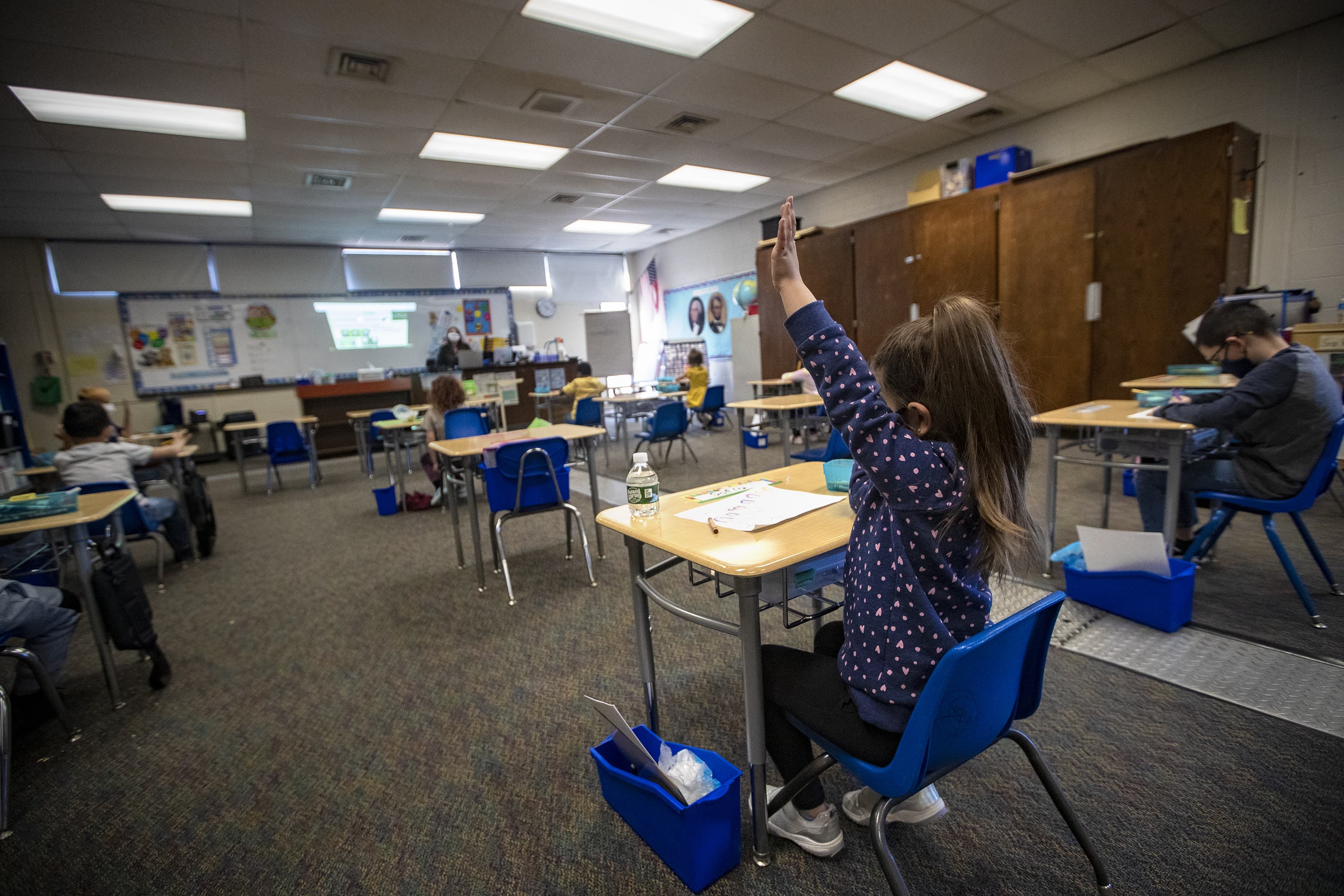Advertisement
Emergency-licensed Mass. teachers' performance on par with other new educators, report finds
In spring 2020, the pandemic interrupted teacher preparation programs and the administration of the state’s licensure test. Massachusetts officials worried aspiring educators would be blocked from entering the profession, causing a teacher shortage.
By June, Massachusetts authorized an emergency teaching license to keep educators flowing into the system. Those with a bachelor's degree could qualify, with the idea that they would complete licensure requirements down the road.
Three years later, the number of emergency licenses issued has soared to over 19,000, according to a spokeswoman from the state Department of Elementary and Secondary Education. But an open question is how the influx of emergency-licensed teachers has impacted the quality of the workforce.
A new study by researchers at Boston University’s Wheelock Educational Policy Center provides some early answers: quality was not impacted much at all.
“There’s really no indication that the students who were assigned to emergency license holders were getting teachers who were substantially different on any of the traditional measures of effectiveness,” said Andrew Bacher-Hicks, an assistant professor of education policy at Boston University and one of the study’s authors.
Looking at the 2021-2022 school year, the report examines how these teachers measured up to peers who completed the typical pathway to licensure. That generally means passing all required Massachusetts Tests for Educator Licensure (MTELs) and completing an approved educator preparation program.
While teacher effectiveness can be measured in various ways, the researchers took a three-pronged approach. The study, commissioned by the state education department, based findings on principal surveys, performance evaluations and student growth on standardized tests during the 2021-2022 school year.
All measures pointed in the same direction: teachers who held emergency licenses performed similarly to other newly hired teachers.
What’s more, the authors found that educators who entered the profession with an emergency license were significantly more diverse than the state’s teaching workforce, were able to fill significant gaps in high-shortage areas like special education and were committed to staying in the profession.
“They're not leaving at higher rates, or substantially higher rates, than teachers who have a traditional license,” said Bacher-Hicks. “And I think some of the fear was that … these people might enter the profession without the commitment that others had because they hadn't engaged in as much preparation.”
The newest study follows an earlier report from the university that revealed Massachusetts’ pandemic-era emergency licensure program helped yield more applications for teacher licensure total than in any of the prior 10 years.
By year two of the pandemic, nearly 25% of the emergency licenses granted were also issued to people of color, a stark contrast to the makeup of Massachusetts’ overall teaching workforce, which in 2021 was just 8% people of color.
While the researchers cautioned against the study’s short time frame and small sample size, their findings suggest a lack of meaningful difference between newly minted teachers who completed required MTELs and those who held emergency licenses.
Among roughly 1,700 emergency license holders, 81% were rated proficient on performance evaluations, compared with an 82% proficiency rate for new teachers with provisional licenses and 88% for teachers with initial licenses. (Provisional and initial license holders have completed their MTELs, but initial license holders have also completed an educator prep program.)
Researchers also found no “statistically significant difference” in student growth on state standardized tests across teacher licensure categories when adjusted for student demographics.
The study also found the educators on emergency licenses largely want to stay in the classroom. Among the 1,300 Massachusetts teachers employed with an emergency license in the 2022-2023 school year, nine out of 10 said they’d like to continue teaching in Massachusetts public schools. More than three-quarters said they'd prefer to stay in the same role.

And the feeling was mutual: most principals said they want to keep many of these teachers, according to the report.
Bacher-Hicks says this debunks the fear an emergency license would allow people to gain easy access to the profession and increase teacher turnover in a workforce with already high turnover rates — 15% of the state’s teaching workforce left their positions last year.
But with the first of these emergency teaching licenses set to expire next June following extensions, some Massachusetts teachers could face a difficult road ahead.
Teachers will need to complete the traditional requirements to keep their positions. And unlike most newly hired teachers, emergency license holders need to complete them in a relatively short period, while working full time.
Deborah Margolis, dean of the Winston School of Education and Social Policy at Merrimack College, has seen this challenge on the ground.
Margolis helps students become licensed teachers. She said it's been harder than expected post-pandemic for teachers to make the jump from holding an emergency license to obtaining a traditional one. The challenges range from financial issues to busy schedules.
“I do worry, as it gets close to next June, and there's a real deadline, that there will be people who will have taught for a number of years on an emergency license, who are suddenly not licensed,” Margolis said. “We'll be on kind of a precarious ground.”
BU’s researchers echo that concern. “We're going to need some tailored supports to really help ensure continuity of these teachers to allow them to remain in the profession,” said Bacher-Hicks.
WBUR’s Carrie Jung contributed to this report.
Editor's Note: Boston University owns WBUR's broadcast license. WBUR is editorially independent.
